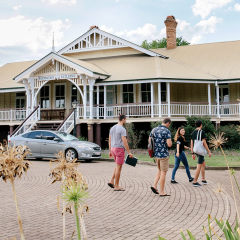Written by UQ Wellbeing. This is a 4-minute read.
“Not getting enough sleep is just part of uni life I guess.”
We’ve all been there, when we attribute poor sleep as a characteristic of student life, and that it’s something that we should self-manage. Coupled with existing myths (Further read: Article by UQ Mythbusters ) that tend to surround sleep, it can be hard to build and maintain healthy sleep habits and routines.
It’s just sleep, it shouldn’t be that important right?
There is a plethora of evidence-based research, reviews and grey literature around how sleep quality can influence a variety of health outcomes. While you sleep, your body is still ‘working’, regulating biological functions that in turn affect how you perform mentally and physically while awake.1,2 In addition to affecting academic performance, the quality of your sleep and the frequency of sleep disturbances can affect your mood, mental health and physical health as well.3-5
While there are many environmental and social factors that have an influence over our sleep quality, behaviours and patterns, here are some tips you can add to your toolkit to getting better sleep:
1. Start your day with sunlight
Viewing sunlight (do not directly look towards the sun) within 30 to 60 minutes of waking up can help regulate your body’s circadian rhythm – an internal clock that signal to your body whether to feel sleepy or awake.
Consistent exposure to natural light can help reinforce a regular sleep-wake pattern, and help boost your mood and energy levels through the production of serotonin.
2. Incorporate regular exercise
While there are various research and discussions around when the best time to exercise is for better sleep, having regular exercise or physical activity in your daily routine is a good step to take in improving your overall sleep health. Exercise can regulate stress hormones (i.e. adrenaline and cortisol) and increase the production of feel-good hormones (i.e. endorphin), which can enhance your mood and allow for you to relax. Your circadian rhythm (aka the internal ‘clock’) can also be stabilised and consequently, enhance your sleep-wake patterns.
3. Controlling caffeine
Most of us rely on coffee or other caffeinated drinks to get us through our work and studies, so cutting caffeine completely might not be feasible for everyone. However, timing your caffeine intake could allow you to indulge in your favourite caffeinated drink while ensuring quality of your sleep.
Avoiding caffeine intake within the first 60 to 90 minutes of waking, and between 8 to 12 hours before your bed-time (i.e. 1 to 3pm if you usually sleep around 11pm) can help prevent caffeine from interfering with your sleep. Nonetheless, everyone has different levels of tolerance for caffeine -some people can sleep well despite consuming caffeine after 4pm, while some can’t consume caffeine after 11am. Experimenting and understanding your tolerance to caffeine will allow you to apply this tip accordingly.
4. Be mindful of technology use
We would be lying if we say we don’t use our phones before sleeping… but a good habit to build is to limit your technology use at least an hour before your sleep. Using dark/night-mode or setting up a “Do Not Disturb”/ “Wind Down” schedule on your phone can help minimise distractions from your phone/device as your bed-time approaches.
If you feel like you might have insomnia or continuous trouble sleeping, you can visit a doctor/General Practitioner (GP) to receive help and clinical advice around addressing insomnia or other sleep-related disorders. If you are an international student, doctor/GP visits can be covered by your Overseas Student Health Cover (OSHC). Visit Allianz Care Australia or your private healthcare provider for more information about what health services you can be covered for while studying in Australia.
Some sources that you might find useful to check out include:
- My Evidence-Based Sleep Routine | Ali Abdaal (YouTube)
- Sleep Hygiene | Huberman Lab
- 6 tips for better sleep | Sleeping with Science, a TED series (YouTube)
- Managing Sleeplessness | Self-help resources (my.UQ)
References:
1. Lim DC, Najafi A, Afifi L, Bassetti CL, Buysse DJ, Han F, et al. The need to promote sleep health in public health agendas across the globe. The Lancet Public health. 2023;8(10):e820–e826.
2. Phillips AJK, Clerx WM, O'Brien CS, Sano A, Barger LK, Picard RW, et al. Irregular sleep/wake patterns are associated with poorer academic performance and delayed circadian and sleep/wake timing. Scientific reports. 2017;7(1):3216–13.
3. Hershner S. Sleep and academic performance: measuring the impact of sleep. Current opinion in behavioral sciences. 2020;33:51–6.
4. Carpi M, Cianfarani C, Vestri A. Sleep Quality and Its Associations with Physical and Mental Health-Related Quality of Life among University Students: A Cross-Sectional Study. International journal of environmental research and public health. 2022;19(5):2874.
5. Becker SP, Jarrett MA, Luebbe AM, Garner AA, Burns GL, Kofler MJ. Sleep in a large, multi-university sample of college students: sleep problem prevalence, sex differences, and mental health correlates. Sleep health. 2018;4(2):174–81.



